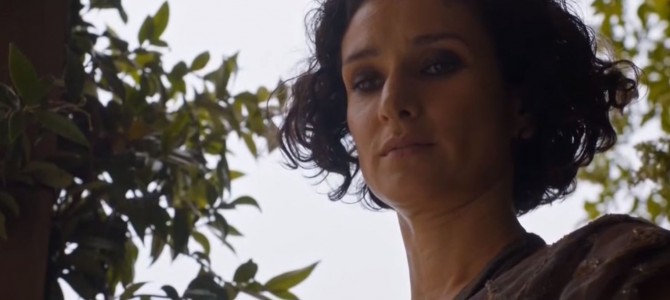
There’s something wrong with our culture when we have to praise women for making stupid decisions. I’m, of course, talking about “Game of Thrones.” The season six premiere featured a woman-led coup in Dorne, the southernmost region of Westeros. The Sand Snakes—the late Oberyn Martell’s paramour Ellaria Sand and his illegitimate daughters—brutally murdered prince Doran Martell and his son Trystane. “Weak men will never rule Dorne again,” Ellaria sneers after stabbing Doran.
Some reviewers eagerly praised this plot line as an example of women’s empowerment. Todd VanDerWerff of Vox listed the coup as win for the ladies in the show. Abby McIntyre writing in Slate gushes, “I certainly found the Sand Snakes’ coup thrilling. It was a great comeuppance for the men of Westeros writ large, and I love seeing Ellaria’s daughters take what’s theirs.” Also in Slate, Jacob Brogan concurs that he was rooting of the Sand Snakes “because it was great to see women not just doing something but actually at the heart of the action.”
Brogan writes, “Seeing the decadent phallocrats of Dorne taken down was surprisingly exhilarating—and surprisingly righteous. Doran Martell was far from the worst, but he was representative of a particular kind of masculine ickiness that has typically gone unpunished on this show. It was delightful to watch Ellaria Sand do something about that.”
Women or Not, Dumb Is Dumb
Having women instigate the coup does not render it a just or noble cause. Let’s be honest: The Sand Snakes demonstrated terrible judgment. Compared to the rest of Westeros, Dorne was a functional political order. Prince Doran was restrained and merciful. Although the Sand Snakes claim to act on behalf of Dorne, they violate what has made the region exceptional in the “Game of Thrones” universe.
Following Robert’s death, Dorne had been insulated from the strife in Westeros. Historically, Dorne’s relationship with the rest of Westeros has been on its own terms. The Targaryens never conquered the region. Dorne allied with the Iron Throne through marriage instead (Elia Martell married Rhaegar Targaryen). The Martells did not make a claim to the Iron Throne after Robert’s death; they made an alliance with the Lannisters. Tyrion Lannister offered Myrcella in marriage to Doran Martell’s son, Trystane. To Myrcella, Dorne is a dreamworld: she wanders through the water gardens escorted by her loving fiancé.
The Sand Snakes may have acted on the Dornish people’s behalf, but not in their best interest. The people of Dorne are passionate and irrational: according to Bronn (in much more colorful language), their two favorite pastimes are sex and fighting. Dorne is a vengeful people. They want revenge for the deaths of Elia Martell and Oberyn Martell.
Lannister loyalist Gregor Clegane (“the Mountain”) killed them both, but for different reasons: Elia was raped and murdered during the sack of King’s Landing; Oberyn died because he failed to swiftly execute Clegane when he had the opportunity. Doran can stomach personal grief, but not war. He is a good governor, because he does not share his people’s weaknesses.
Doran Martell Didn’t Deserve Death
Doran’s restraint distinguishes him from most other noblemen in Westeros, where personal vendettas have dramatic political consequences. Robert Baratheon rebelled against the Targaryens because Rhaegar Targaryen raped Lyanna Stark, Ned’s sister and Robert’s intended. Walder Frey staged the Red Wedding because Robb Stark reneged on his promise to wed a Frey daughter. Cersei Lannister empowered the Faith Militant to settle a squabble between herself and Margery Tyrell. Unlike these other rulers, Doran separates his personal agenda from the needs of his fellow Dornishmen.
Doran Martell communicates his hatred of the Lannisters in politically savvy ways. He welcomes Myrcella into his home and accepts her as a future bride to his son. But neither Doran nor Myrcella attend Joffrey’s wedding to Margery. Doran sends his brother, the outspoken, brash Oberyn as his representative. Oberyn snubs his welcoming party, making Tyrion greet him in a whore house. The Lannisters are a proud family, yet the Martells shame them without any bloodshed.
The Sand Snakes claim to act on Oberyn’s behalf, but their tactics are contrary to Dornish norms and Oberyn’s wishes. The Martells pride themselves on their mercy towards children: The Dornish don’t harm little girls, Oberyn routinely reminds his hosts in King’s Landing. Oberyn assures Cersei of her daughter’s safety based on this maxim. Doran echoes the same message to Ellaria when she suggests sending Myrcella back to Cersei one piece at a time: “We do not mutilate little girls for vengeance. Not here. Not while I rule,” Doran responds.
To be fair, perhaps Dorne won’t spiral into disorder immediately. Perhaps the coup will give Daenerys a potential ally for retaking the Iron Throne. Something good may come from the coup, but it will be the result of accident rather than foresight.
The Dorne coup was not an instance of women rising up against male injustice. On balance, Doran Martell was a decent ruler. He tried to curb the people’s worst instincts and protect Dorne from the devastation of war. The Sand Snakes murder a little girl and drive Dorne to war to alleviate their grief and assuage their appetite for vengeance.
“Game of Thrones” has oodles of interesting, well-developed female characters. Some have good judgment; others, abysmal judgment. There’s no need to praise bad decisions, simply because women make them.









